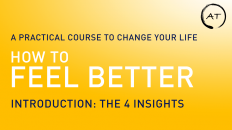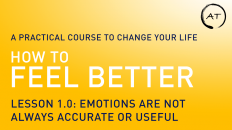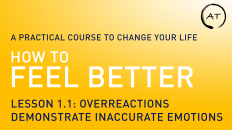You can actively change your emotions to feel better. Below, I will outline how. For beginners, I recommend using a pen and paper to write down the description of the emotion and your answers to every question. This will let you see whether your emotion has changed.
- Begin by choosing an emotion. Give it a name, a color, and an intensity. What adjectives describe the feeling (burning, jagged, sour, etc.) ? Where is the emotion in your body?
- Feel the emotion, amplify it, and reach for the memory behind the emotion.
- Find a memory that has the feeling in it. Then see if there is an even earlier memory with the feeling in it.
- When you have found the earliest memory behind the emotion, walk through the memory and ask yourself the following questions:
- What happened?
- How did you feel at each step?
- Why did you have these feelings?
- What assumptions are you making around what happened?
- What assumptions are you making about other people and their behavior?
- Are there any other possible explanations for what happened?
- Are you taking anything personally? Are there more likely explanations behind other people’s actions?
- Did you do the best you could given the situation? If not, why not?
- Are there any conflicting emotions in the memory?
- How does this memory apply to your life right now?
- What is the purpose of the emotion? Does this align with your goals?
- Is there an earlier memory with this feeling? If so, repeat these questions for that memory.
- Try to frame the events in a realistic, accurate way. You will feel better if you accept what happened fully or find a more positive explanation for what happened.
- Look at the purpose of the emotion. You must want to not have the emotion to let go of it.
- After your reflection, describe the emotion again. Give it a name, color, intensity, location, and adjectives.
- How do the descriptions compare?
Any change in the emotion means you’ve had an effect. The more you understand what happened, the less uncertain and scary the emotion is. If you know your fear of milk comes from that time you drank spoiled milk and got sick, milk itself is no longer scary.
The other key aspect of this exercise is the idea that emotions are choices. If you don’t want to have an emotion, you won’t have it. This is very particular. I don’t mean dislike. I mean do not want.
I don’t like that I’m scared of lions. The fear feels unpleasant. However, I absolutely want to be afraid of lions. I rarely see them, and, if I do, I want the adrenaline to run like heck away from them. I thought about the fear and decided that I want to have it.
Every emotion has a purpose to our mind. In order to let go of an emotion, you must feel or decide that the purpose is fulfilled or not useful.
Continuing on. Now that you have changed your emotion in some way, you can change the emotion in specific ways or even release it completely. You just have to explore the most emotional parts of your memory. When you understand what happened, your emotions will have been heard. They will no longer shout at you. Their purposes have been fulfilled when you learn the emotions’ lessons.
It’s useful to give you a personal example here.
As a teenager, I wanted to have an active social life. But I would psyche myself out of talking to people. It was really hard to make new friends when I was so shy.
Around this time, I learned about emotions. So I felt my shyness. I amplified it and searched my memories.
I remembered feeling unworthy in middle school. But then, I remembered the feeling at the beach in grade school. Earlier still, I remembered one day at preschool.
I had found my earliest memory of feeling unworthy.
That day, I found myself sitting at the curb, waiting for my mother to come pick me up from preschool. It took her two hours to pick me up! When she did, she wasn’t happy with me.
She must not love me. I must not be worthy of love.
But then, I re-examined why I believed that. I looked at the reasons for what happened.
My babysitter was supposed to pick me up that day. When my babysitter came, I told her that my mom was going to pick me up. The babysitter said that my mom was not going to pick me up, but I insisted that my mom would come.
My mom wasn’t supposed to pick me up that day. She was at work, over an hour away.
When my babysitter left, I had to wait. Eventually, I waited so long that the school phoned my mother. My mom then had to leave work early to pick me up. She must have been frustrated.
She didn’t forget about me. It wasn’t that I was unworthy of her love. It was just that, as a four-year-old, I didn’t remember that I was supposed to go home with my babysitter that day.
When I understood this, the feeling of unworthiness evaporated. What happened to me that day was a common mix-up. I made the wrong assumptions around what happened, and I saddled myself with low self-worth for the next decade.
My social life dramatically improved once I came to peace with this memory. All of a sudden, I was no longer shy.
Besides relieving myself of the emotional burden, I also gained back the mental energy that the emotion was taking up. All emotions take up mental energy, and if the emotion is not helpful, the energy is worth reclaiming.


